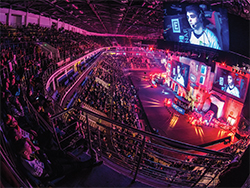 Powered by rapid technological developments and ease of accessibility, esports is moving from the bedroom to the mainstream – complete with large-scale events, professional players and opportunities for investors who want in on the game
Powered by rapid technological developments and ease of accessibility, esports is moving from the bedroom to the mainstream – complete with large-scale events, professional players and opportunities for investors who want in on the game
It is a Tuesday evening in Jersey and something quietly revolutionary is happening. A team of six local gamers are playing Super Smash Brothers at esports.je, a gaming hub in St Helier co-founded by aficionado Ed Peck.
The team is competing with other gamers on Guernsey and the Isle of Man. And the action is being watched by several hundred fans on video game streaming channel Twitch.
This sounds a far cry from kids holed up in their rooms playing games alone on a console, but it’s merely a grassroots example of esports – which is fast becoming a popular global phenomenon, with large-scale interest and large-scale investment opportunities to boot.
Esports, which sees professional gamers compete for cash prizes in titles such as Fortnite, League of Legends or Counter-Strike: Global Offensive (CS:GO), has blossomed in recent years.
Players with lightning-fast reactions can rake in millions of dollars from winnings and sponsorship deals.
Global tournaments are able to draw in tens of thousands of fans; and media companies compete to broadcast the content to home viewers.
Esports gains traction
“Competitive gaming isn’t exactly a new thing,” says Kevin Cheung, a lecturer at Staffordshire University. Ever since the earliest video games came out 40 years ago, it’s been possible for people to play one another competitively.
“However, technological improvements have made it much easier for people to play and watch graphics-intensive games. These advances have laid the foundation for gamers to play one another live or watch competitions hosted online.”
As more people have begun watching other people play, a whole ecosystem has grown up around esports. Video game publishers now host tournaments of popular titles, grassroots leagues run their own events, and websites such as Twitch – which is owned by Amazon – and YouTube stream matches.
In many ways, the esports sector is comparable to its physical counterpart. Most gamers play casually in local leagues or with friends, and the best might have the opportunity to go professional, joining a team where they receive a salary or tournament winnings.
Going pro requires a lot of dedication. Gamers must spend hours each day practising and Cheung – a former gamer himself – notes that today’s pros are embracing help from sports psychologists, nutritionists and coaches.
On the organisational side, David Powell, Insight and Analytics Director at consultancy Landor, explains that there are two key actors in the sector – teams and game publishers.
“A major publisher creates a game, then either the publisher or a promoter creates an organised league or tournament. Esports teams then sign-up to the leagues, typically with an entry fee, a broadcast relationship is agreed with an online stream, and live events and competitions are then created.”
And the interest is global, although it is particularly popular in North America, Europe and certain Asia Pacific countries, notably South Korea.
Pay and pixels
When it comes to monetising esports, Powell believes that revenue generation is similar to traditional sports.
“Money is made from broadcast, sponsorship, event tickets, merchandise, advertising and so on,” he says. “Broadcast revenues are still key, as with most sports, but for esports they are working with streaming partners rather than conventional broadcasters.”
And the revenues are not inconsequential. Individual players can net upwards of $1m in winnings from some tournaments, and PwC estimates the industry will be worth $2bn by 2023.
Investors in traditional sports, such as Arsenal owner Stan Kroenke or Andy Miller of basketball’s Sacramento Kings, also now own esports teams and leagues.
However, esports is different to traditional sports in one key respect. “If FIFA [football’s governing body] collapsed, you would still be able to play football,” explains Andy Miah, an academic at the University of Salford.
If a gaming publisher such as Activision went bankrupt, however, competitions based around games such as Call of Duty would disappear.
Miah notes that in many ways, gaming competitions are essentially marketing tools for the publishers’ games – the more fans who watch World of Warcraft tournaments, for instance, the more people are likely to spend on the games themselves, or the in-game purchases available.
Ed Cave, Relationship Manager at HSBC Private Banking, believes there is an important distinction between esports and video games. The computer game industry generates some $150bn in revenue annually – esports represents less than 1% of that total, he says.
Nonetheless, the sector is under-monetised and certainly has scope for growth. “It is supported by a huge base of hundreds of millions of spectators and amateur participants,” says Cave.
“This creates an opportunity for investors who are willing to take the risk to get involved at such an early stage for the industry.”
Miah agrees that the potential is enormous, adding: “Gaming is one of the most prominent forms of cultural experience we have in the world today.”
You only have to look at the level of games downloaded to mobile phones every day to see that.
 Competing with the real thing
Competing with the real thing
During the coronavirus lockdown, when all physical sports events had been cancelled, Formula One fans were still watching world-famous drivers like Belgium’s Max Verstappen competing in front of huge audiences.
This was possible thanks to a company called Engine Media, a media and events business active in both the physical and esports auto racing sectors.
Darren Cox, the company’s CEO, explains that Engine Media had been preparing to cover the physical Australian Formula One Grand Prix just before the lockdown cancelled the race.
So the company responded quickly to set up esports competitions, bringing together professional F1 drivers and the world’s best esports players in races in front of live audiences.
“Over the following 16 weeks we held live races, and the first one received some 500,000 viewers,” says Cox. What’s more, Engine Media’s races went out live on ESPN and Eurosport.
Cox explains that part of the appeal of esports can be attributed to the fact that it allows younger players to become more engaged with the sport.
“We see many people playing a Formula One racing game at home, then switching off before the physical or esports race, to watch the professionals,” he says.
The esports community also provides a way for fans to interact with their heroes in a way they never could in the exclusive world of motorsports. And many professional racers, like Max Verstappen, are also big gamers themselves.
It might seem extraordinary that people would, fundamentally, pay to watch other people play video games, but, like other sports, the game itself is only part of the appeal.
Andy Miah points out that attending a stadium event is all about “community and celebration of excellence in something you value, as well as the desire to ‘be there’ when something historic happens”.
Kevin Cheung adds that esports events have “a great atmosphere” and that being “surrounded by people who share the passion” is unique.
As the technology improves, the experience will get better as well. Imagine using a VR headset to be able to follow your favourite player, or to choose your own view of the action?
And, in a sign of things to come, Miah reports that new arenas, designed specifically for esports, are now being built.
Esports controversy
Of course, like all sports, esports is not completely free of challenges and controversies.
Cheung says there are a number of issues facing the elite game, including the use of performance enhancing drugs, worries about gaming addiction and a tendency for esports to be male dominated.
He adds that in the UK there is a propensity by teams to exploit young gamers – many work for free in the hope of getting into the big leagues. There is also plenty of boorish and misogynistic bantering between gamers online.
As esports becomes more professionalised, David Powell believes it is likely that games publishers will set up governing bodies to regulate rules around behaviour in the sector.
That said, Miah notes that publishers may not be especially motivated to impose regulations, since their main aim is to make money from esports.
As the rise of esports shows, computer games are no longer simply something to be played for fun at home. Millions of fans tune in to watch competitions that feature talented gamers, and serious money passes hands.
And its potential is considerable. As David Powell says: “Every major sport in the world is terrified about what’s happening at a grassroots level. Youth football and cricket clubs are struggling because of a lack of cash and a lack of kids, and baseball’s ability to identify new talent out of the US has collapsed in the last 20 years.”
Meanwhile, he adds: “Esports has never been stronger at a grassroots level.”